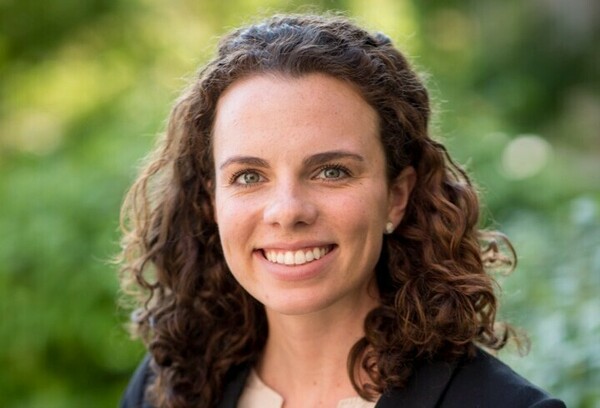
Amidst concerns about climate change, understanding how ecosystems may respond to global environmental alterations becomes increasingly important.
Megan Vahsen, who is graduating in May with her doctorate in biology from the University of Notre Dame, has been awarded the prestigious Shaheen Graduate School Award which recognizes one outstanding graduate student from the College of Science. Her work connects evolutionary biology and ecosystem ecology to study how populations evolve rapidly in response to environmental changes and how this evolution, in turn, influences ecological dynamics.
Vahsen examines the rapid evolution of Schoenoplectus americanus—a grass-like plant found in the marshes of the Chesapeake Bay—over the past century and the impact of that evolution on predicting the resiliency of the coastal marshes in the face of sea level rise.
“Plants in coastal marshes are really important in regulating accretion (how fast the marsh can build its surface elevation) and carbon sequestration (the process of storing carbon), so understanding how their traits shift can tell us a lot about ecosystem functioning at-large,” she said.
Vahsen uses a data-model integration framework to combine long-term ecological data from the Smithsonian Environmental Research Center, field and lab experiments, genetic sequencing, and remote sensing in order to better understand changes in plant composition within the marsh.
“This work allows us to quantify how much evolutionary processes matter when predicting the state and fate of coastal marsh ecosystems,” Vahsen explained.
Vahsen worked with Associate Professor Jason McLachlan to conduct her research. She expressed her appreciation for McLachlan’s support and for how he has helped her develop valuable research, teaching, and management skills.
“He's challenged me a lot to think big, both in the scientific questions I ask and also in what I can achieve in my career,” she said.
Vahsen’s family is from the Chesapeake Bay area, so she has a personal connection with the coastal ecosystems she studies.
“I was excited to work on ecological questions I was interested in while working in ecosystems that I really cared about personally,” she said.
Vahsen has enjoyed conducting research at Notre Dame and appreciates the faculty and students she has met.
“One of the most rewarding parts about being at Notre Dame has been working with and teaching some really incredible undergraduate students,” she said.
Upon graduation in May, Vahsen will assume a postdoctoral fellow position at Utah State University where she will continue researching the effects of climate change on ecosystems.